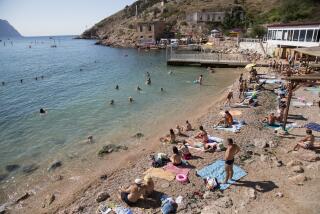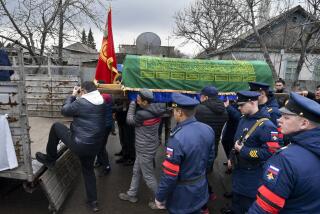UKRAINE : Tatars Regaining Lost Ground in Crimea Homeland : Fifty years after deportations by Stalin, repatriates are establishing communities and mustering political clout. But some are seen as squatters in their native land.
- Share via
SIMFEROPOL, Ukraine — In a muddy field at the edge of Crimea’s capital, far beyond the last bus stop, 126 Tatar families live in a squatter settlement with no running water. Since they battled police for this squalid patch of their homeland, electricity is the only convenience they have gained.
So it pushed Sofia Kadyrova over the edge when the electric company, facing an energy shortage and needing to ration, turned on the settlement’s power only between 1 and 5 a.m. for days at a stretch, forcing the 48-year-old Tatar physician to be awake much of the night cooking and doing housework.
Backed by seven neighbors, she barged into the utility office and burst into tears. The chief, an ethnic Russian, shrugged. Then they turned to Ilmi Umerov, a Tatar deputy prime minister of Crimea. “When we returned home, the lights were on and stayed on,” Kadyrova said, savoring the small triumph.
Half a century after they were deported en masse to Central Asia--unfairly accused by Josef Stalin of aiding the Nazis--and seven years after they began coming home, the Tatars have mustered some political clout. But it has not removed all the barriers to resettling the land their Turkic ancestors ruled for three centuries.
“There is no state policy for repatriating the Tatars, no laws guaranteeing our property rights, not enough money to help us start over,” says Refat Chubarov, a Tatar in Crimea’s Parliament. “We don’t have enough influence. None of our laws ever gets adopted.”
Undoubtedly, Tatars have made important gains in Crimea, the Black Sea peninsula now governed by Ukraine but dominated by ethnic Russians. About 236,000 Tatars have returned to Crimea and make up nearly 10% of the population; a similar number hope to follow.
Seizing idle farmland, Tatars have built makeshift houses, tapped into power lines, fought police eviction squads and won de facto recognition of 300 communities. They once mobilized 5,000 demonstrators and stoned the Parliament building to get 26 arrested squatters freed.
Tatars own a commercial bank, run three primary schools, publish three newspapers and get two hours a week of programming on Crimean television. They have staged sit-ins to recover mosques that Stalin did not destroy. Qualified Tatar professionals have little trouble finding jobs.
*
Bowing to Tatar activism, Crimea’s Parliament last year adopted quotas for ethnic minorities, giving Tatars 14 of its 98 seats. Two Tatars are in the Crimean Cabinet. Because they have achieved all this with little violence, Tatars say they are overcoming decades of Soviet propaganda and becoming more accepted socially.
Fearful that ethnic conflict could erase their gains, Tatar lawmakers support Ukrainian sovereignty in Crimea against Russian separatists, while trying to mediate between pro-Russian and pro-Ukrainian forces. But that stand has alienated Crimea’s pro-Russian leaders, who reportedly have diverted Ukrainian government funds intended to build Tatar housing and schools.
Nor has Tatar loyalty to Ukraine been fully rewarded. Ukraine’s Parliament has passed a law making Tatars who returned home after 1991 ineligible to vote. And this year’s funds for Tatar resettlement have been slashed by half in the dwindling Ukrainian budget, to about $6.5 million.
As a result, only a few thousand Tatars are expected to come home this year.
In the squatter settlement here, newcomers face growing hardships. Apparently intent on selling the land, Crimean authorities refuse to legalize the 30 newest homes or give their occupants work permits.
Seleme Ivazova, 2 years old when her family was deported to Uzbekistan in 1944, arrived the other day to live in one of those homes. Her two sons built it in three years while living in a plastic-covered trench and dodging bulldozers that twice razed the project.
For all their effort, their mother looked depressed. This, after all, is not the choice coastal property her family was expelled from; that’s occupied by Russians now. And her husband, who is blind, must stay in Uzbekistan with one son until they sell their house there.
“I was in shock when I arrived,” Ivazova said. “All I saw was a muddy field and these pathetic houses. Simferopol is a very gray city, but it’s not from the dust. It’s from our tears.”
More to Read
Sign up for Essential California
The most important California stories and recommendations in your inbox every morning.
You may occasionally receive promotional content from the Los Angeles Times.










